10 Up-and- Coming Faith Influencers of 2021
By Paul O'Donnell
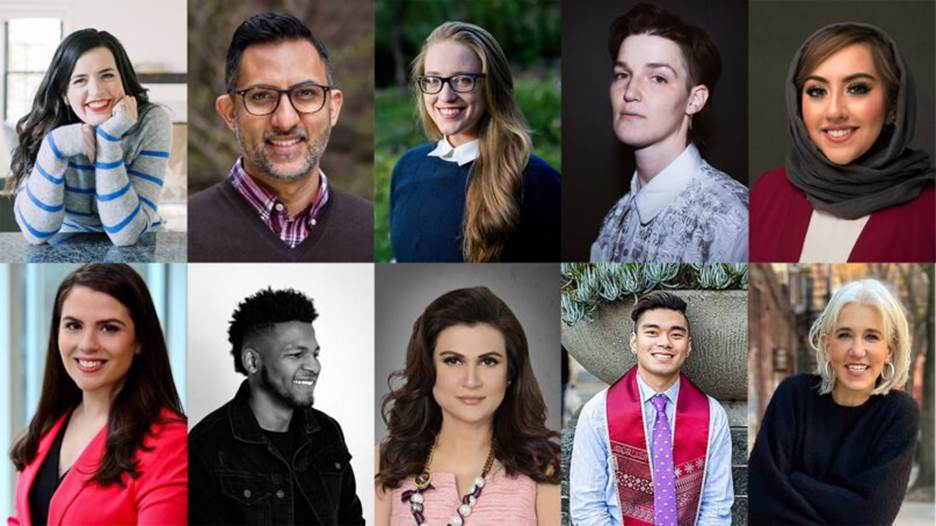
On a list of emerging religious voices, you might expect to find a number of clergy, but in a year of political tumult, pandemic fatigue and ever-widening partisan divides, the faith-based voices that rose to the forefront were those speaking as much to social concerns as spiritual ones.
From the halls of academia to the local school board, from podcasts to political activism, from climate cartography to police mediation, 2021’s rising stars in religion underscore the ongoing influence religion has in every sphere of American culture.
Devon Matsumoto
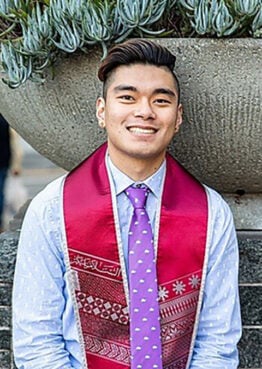
Devon Matsumoto. Photo courtesy of Young Buddhist Editorial
Matsumoto, a 24-year-old social worker, all but grew up at the Buddhist temple in Mountain View, California, that his grandfather helped to build and where his parents worked. As an adult, however, he noticed Buddhism in the US is rarely depicted as part of Asian Americans’ legacy — despite the fact that two-thirds of the nation’s Buddhists are Asian American, according to the Pew Research Center.
In January 2020, Matsumoto, his friend Trevor Yokoyama and a few others started Young Buddhist Editorial , an online forum that frankly examines Buddhist life in the US, spotlighting Buddhist front-line health care workers while not shying from articles about anti-Blackness among Asian Americans. “We noticed that being Buddhist and being Asian American, our stories are being told for us,” Matsumoto said. “One of our big
pushes is to have our communities tell our stories.”
Young Buddhist Editorial also aims to keep young adults connected to Buddhism at a time when just 48% of second-generation Asian American Buddhists are retaining their religion.
But mostly it tries to challenge stereotypes of Buddhists as “these forest-dwelling monks who sit on a rock all day and meditate,” said Matsumoto. “We have things to say, we get upset, we get angry, and when injustice happens right in front of us, we’re going to say that’s injustice and we’re not going to hide behind our teachings and say, ‘Oh, well, all this happens for a reason.’”
Kate Bowler
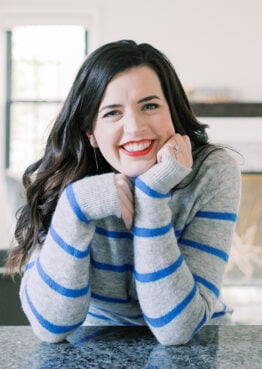
Kate Bowler. Photo by Rebecca Ames
A woman who already has a small shelf of books to her name may no longer qualify as a rising star, but this year saw Bowler, a historian at Duke University, expand her reach significantly as a cultural critic, a memoirist and a popular podcaster . Her conversations with Malcolm Gladwell, David Brooks and Cindy McCain have broken her out of the small world of religious studies.
Having established herself as a chronicler of evangelical Christianity in her 2013 book “Blessed,” about the prosperity gospel , and 2019’s “ The Preacher’s Wife ,” about prominent Christian women, Bowler, 41, has lately turned her focus on the wider American obsession with redemptive positivity, informed by her own experience as a cancer survivor. In two memoirs, “ Everything Happens for a Reason ” and this year’s “ No Cure For Being Human ,” Bowler questions the search for our “best lives” while probing darker truths about suffering and the self.
Bushra Amiwala
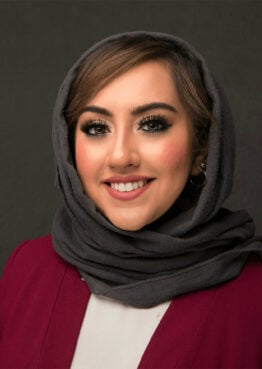
Bushra Amiwala. Courtesy photo
In a year in which school boards became battlegrounds in the culture war, Amiwala has used her school board seat in suburban Chicago as a beacon of reconciliation and understanding. The 2020 graduate from DePaul University is the youngest Muslim to hold elected office in the United States, a distinction she regards as more than just a demographic footnote: “My faith teaches me the importance of service work and getting involved in the community,” she told the Chicago Tribune in April.
Her evident faith — Amiwala is also thought to be the only hijab-wearing officeholder in Illinois — has brought her fame not normally associated with local school board commissioners. She was profiled in an ABC/Hulu documentary, “Our America: Women Forward,” and appeared in “And She Could Be Next” on PBS and on Amazon Prime’s “RUN,” and is a busy speaker. (She also works full time as a sales representative for Google.)
More than a model of Islamic tenets of service, Amiwala talks frequently about the resilience of her immigrant parents, who escaped what Amiwala described as “extreme poverty in Karachi” to move to the United States, and the intentional religious and ethnic diversity of her hometown of Skokie. “The Muslim community has built strong bridges and made allies with other parts of the community,” she told Religion News Service’s Joseph Hammond in March.
Danté Stewart
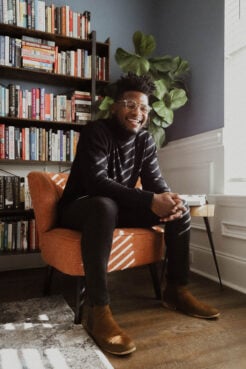
Danté Stewart in his office. Photo courtesy of Taja Ambrose, CrownedGold Photography
A former walk-on cornerback for the Clemson football team with a literary bent. A Black Pentecostal who has spent time among white evangelicals. A guide to aspiring anti-racists who says he is more interested in writing for Black people and capturing Black joy than “answering what white people can learn” from his work. Stewart embodies the unsettled point of view of a Black, Christian intellectual in today’s American society. “I’m going to literature, I’m going to art, I’m going to our bodies to see what type of revelation can be had in both of those,” he told RNS’ Emily McFarlan Miller earlier this year.
His writing, weaving memoir and cultural criticism with Bible stories, can be discomfiting to anyone looking for easy spiritual answers. But Stewart, not yet 30 and still working on his degree from Emory’s Candler School of Theology, has already caught the attention of readers with his autobiography, “ Shoutin’ in the Fire: An American Epistle ,” and is a regular contributor to The New York Times, The Washington Post, RNS and other major outlets.
Sheila Katz
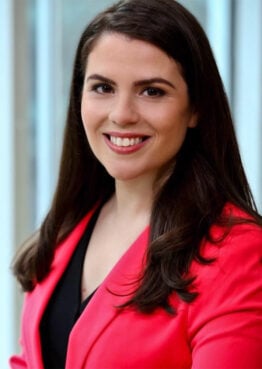
Sheila Katz. Courtesy photo
When Katz was named CEO of the National Council of Jewish Women in 2019, Justice Ruth Bader Ginsburg, the United States’ most prominent Jewish woman at the time, still stood as a bulwark against limits on abortion rights. By the time of Ginsburg’s death in September 2020, Katz had already begun to mobilize her organization to fill the gap. The NCJW helped to launch “Rabbis for Repro,” a mobilization of 1,700 rabbis who believe “Jewish law is clear that life begins at birth, and not prior.”
Katz herself became a ubiquitous presence, protesting and penning op-eds arguing that, since her tradition didn’t forbid abortion, women’s right to choose was a matter of religious liberty. “When a small and loud group of the religious Christian right claims abortion as a religious freedom issue,” she wrote on RNS last year, “we ask: Whose religious freedom are we talking about?”
While her convictions come from her faith, her methods are pragmatically political. As one of the youngest executives of Hillel International, she served on a steering committee for President Barack Obama’s White House Campus Interfaith Challenge in 2014, and in 2018 she launched MitzVote to register young Jewish voters before that year’s midterm elections. No matter how the court rules on recent state laws that threaten Roe, expect Katz to be at the forefront of what comes next.
Molly Burhans
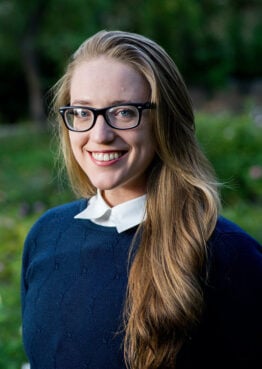
Molly Burhans. Photo courtesy of Ashoka
Burhans was 14 when her father invited his SIMS-loving, fort-building daughter to design a visual for his research on yeast-cell death. From there, Burhans developed a side hustle of doing science illustrations and data visualizations of the systems of the human body. Science led her to her faith. By her senior year of college, Burhans began to yearn to “fill the infinite” inside her, she told RNS’ Renée Roden . She was baptized a Catholic and for a while considered life as a nun.
Instead, she has found a way to combine her fascinations as founder and executive director of GoodLands , a nonprofit that helps Catholic parishes, universities and other church institutions to map their property and manage it to improve its environmental and social impact. “Our work is grounded in science, driven by design, and inspired by Christian values of stewardship and charity,” says the organization’s website.
But for Burhans the work also echoes the Catholic understanding of the “Eucharistic potential of the world,” she said, that everything can become a celebration of creation and of life’s ultimate meaning: love.
VineetChander
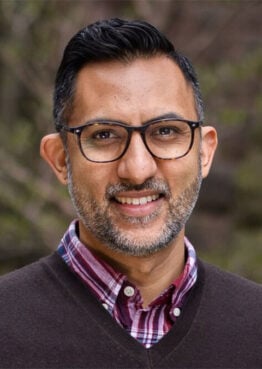
Vineet Chander. Courtesy photo
When Chander accepted his job as the Hindu chaplain at Princeton University in 2008, his own faith community was baffled. “It was incomprehensible to them,” said Chander. Hindu students, too, “had no framework or structure for what it meant to go talk to a chaplain, least of all a Hindu chaplain.” At the time, he was the first Hindu chaplain not only at a place of higher learning, but anywhere in the United States.
But today Hindu chaplaincy is evolving. Chander is now on the board of the North American Hindu Chaplains Association, an organization that grew out of discussions with colleagues Asha Shipman at Yale and Vrajvihari Sharan at Georgetown University, who in 2016 became the first Hindu priest and monk to serve at a Catholic institution.
The growth of Hindu chaplaincy, said Chander, also “speaks to increasing development and evolution of chaplaincy writ large, where it’s becoming a lot less Christian-centric, and there’s a recognition of a real opportunity to have authentic multifaith approaches to chaplaincy.”
Semler
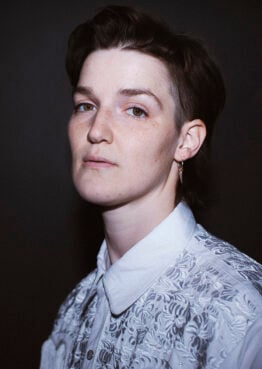
Grace Semler Baldridge. Courtesy photo
In February, “Preacher’s Kid,” a song by Christian singer-songwriter Semler, topped Apple Music’s Christian singles chart. In November, Semler made news again, placing “Hallelujah (In Your Arms)” a song the then-31-year-old Los Angeles-based artist calls an “anthem of queer joy,” on Spotify’s Top Christian Artists playlist.
In a genre that has historically shunned musicians for coming out as gay or even asking questions about same-sex marriage, Semler, whose given name is Grace Baldridge, is among a group of Christian LGBTQ artists carving out a new niche that embraces their identity.
“The community has been a wide assortment of people who, for whatever reason, found themselves on the outs of the religious establishment, of organizations of faith, and yet still felt called to a relationship with God,” said Semler.
Apart from their artistic rebellion, Semler is helping to drive a new route for musicians around Christian music’s traditional gatekeepers. With more than 20,000 followers on Twitter, 38,700 on Instagram and 174,100 on TikTok, the artist can drop music directly on streaming apps and utilize social media, where their songs about gay love and uncomfortable coffee dates with queer-condemning Christians find an audience.
Archie Gottesman
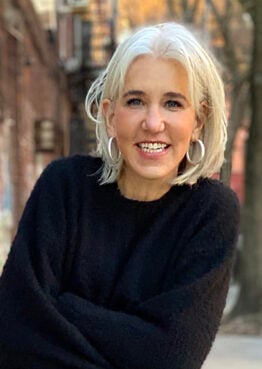
Archie Gottesman. Courtesy photo
Eight years ago, Gottesman, a marketer who had spent her career working in her family’s self-storage business, started the website JewBelong.com with her marketing partner Stacy Stuart. With the tagline “JewBelong: for when you feel you don’t!,” the group hoped to make Judaism more accessible and fun for Jews who had fallen away. But as antisemitism has continued to rise in the United States and abroad, Gottesman applied JewBelong’s irreverent touch to the problem.
The organization paid nearly half a million dollars to put up hot neon pink banners over Times Square in Manhattan boldly pushing back on antisemitism: “Being woke and antisemitic is like being a vegan who eats veal” and “Chocolate hummus on an onion bagel isn’t the hate crime we’re currently worried about,” as well as more sobering signs.
“There’s an undercurrent of Jews in America who feel scared and a little unheard,” Gottesman told RNS’ Yonat Shimron . “If JewBelong is giving them some love, then I think we’re doing important work. We really, really stand against hate. It’s important to speak out. It’s a frightening space.”
Anila Ali
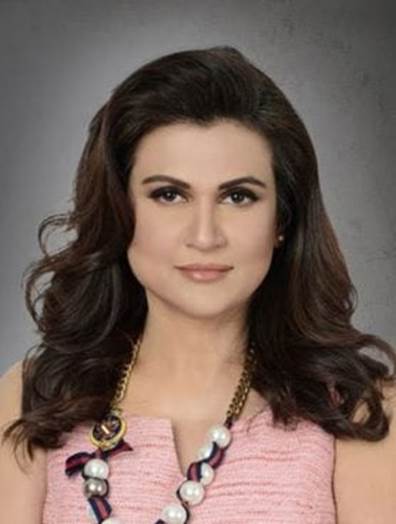
Anila Ali. Courtesy photo
Since 9/11, relations between American Muslims and US law enforcement agencies, from the local cops to the FBI, have been troubled, as surveillance of mosques and Muslim neighborhoods led to accusations of Islamophobia, mutual suspicion and outright hostility.
That’s why Ali decided to invite the police to a fashion show.
In 2016 she founded the American Muslim & Multifaith Women’s Empowerment Council, a nonprofit based in Southern California that seeks to build bridges between the community and law enforcement organizations with Muslim women as the ambassadors. Among her tactics has been inviting Los Angeles Police Department officers to occasions such as the group’s 2018 fashion show, where both sides could let their guard down and talk about their common concerns about terrorism.
AMMWEC further makes connections by providing Muslim women job opportunities in law enforcement: A half-dozen women have completed formal law enforcement internships. Others have taken courses with the FBI and formed partnerships with the CIA, according to Ali, who has won congressional leadership awards from US Reps Judy Chu and Loretta Sanchez.
In some Muslim communities, Ali said, perceptions about law enforcement have begun to shift, as crime-fighting agencies have turned to countering violent Islamophobia and as the Biden administration has placed increasing emphasis on monitoring far-right extremism. But her approach to detente with law enforcement has already done much to change the conversation. – Religion News Service

